News
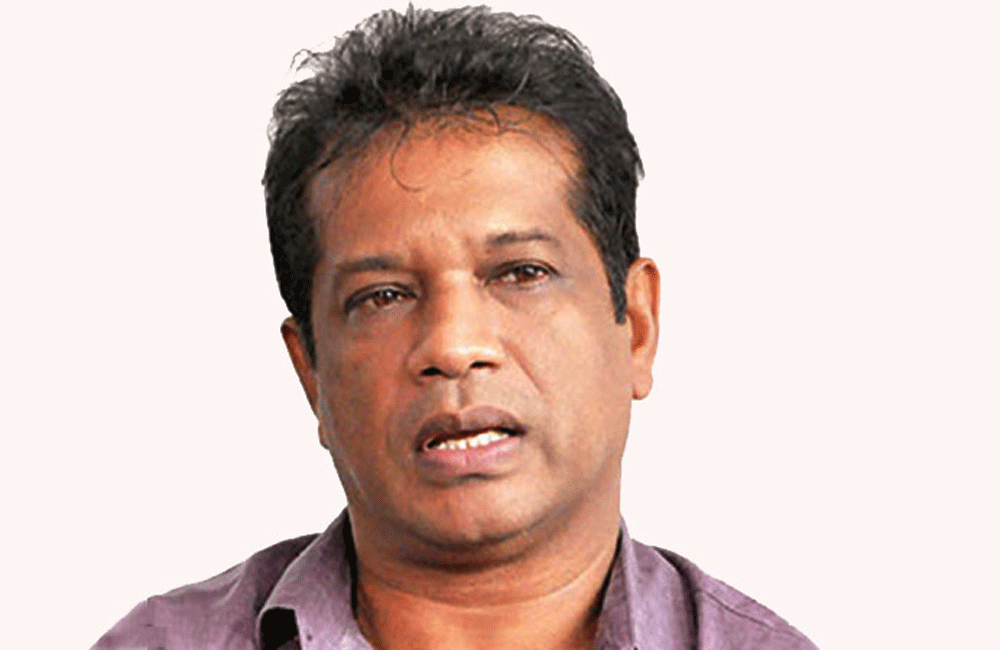
"Next tsunami against bureaucrats"
JVP firebrand, Agriculture Minister K.D. Lalkantha raised red flags against bureaucrats who, according to him, have not changed but obstructed the government from taking the country forward.
“The people of this country brought a tsunami against corrupt, outdated politicians who dragged this country backwards and pushed it to bankruptcy.”
“The next tsunami will happen against the bureaucracy of this country,” he warned.
The Minister emphasised that senior government officials should have a clear understanding of their responsibilities and obligations, as well as their duties.
He stated that merely building a country based on a corruption-free, fraud-free, and prosperous democratic government is not sufficient for the nation’s progress and the establishment of an uncorrupted State.
It also requires dedication, honesty, and high-level leadership in the public service.
It had previously been acknowledged in society that despite high-ranking political representatives in the country being corrupt, with many involved in the theft of state assets, public property, and public wealth, a significant number of senior public officials had also been complicit in these corrupt practices and criminal activities, although the number of such officials was relatively small, as pointed out by Lalkantha.
He noted that many government institutions had been highly inefficient over the past period, and substantial funds had been spent on their maintenance.
He added that although political leaders could provide the leadership for strengthening institutions and ensuring the necessary infrastructure and financial resources for national development, it is the responsibility of public officials to understand who should implement these tasks.
President Anura Kumara Dissanayake also stated during a recent meeting with senior public servants that public service reform was essential.
(ceylontoday.lk)
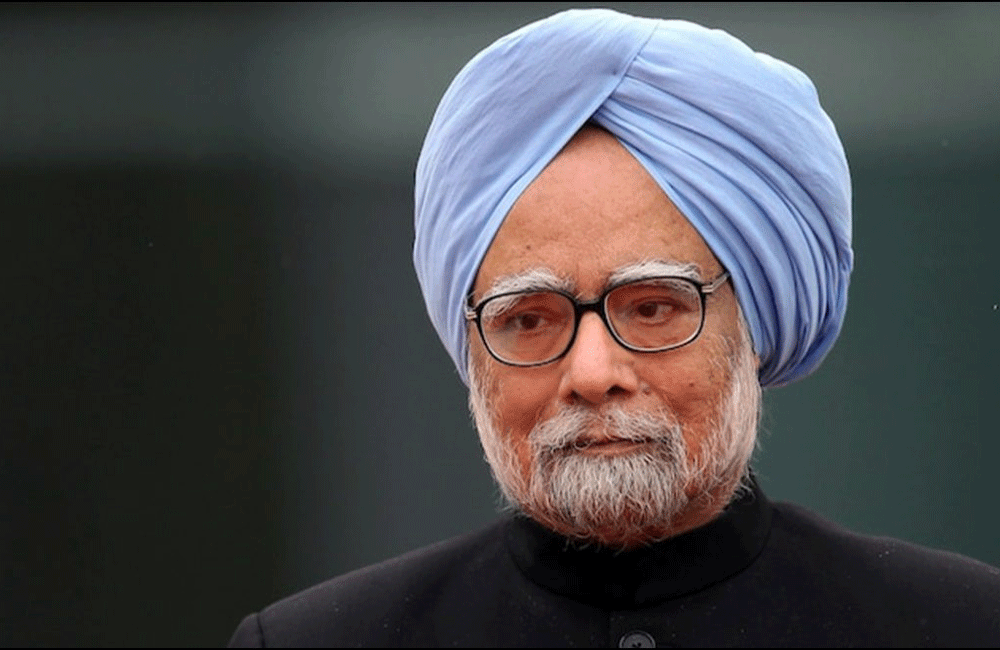
Former Indian PM Manmohan Singh passed away
Former Indian prime minister Manmohan Singh dies at 92
He was admitted to the emergency department of the All India Institute of Medical Sciences (AIIMS), where he breathed his last, the hospital confirmed.
The former prime minister was administered CPR (cardiopulmonary resuscitation), but efforts to revive him remained unsuccessful, said sources.
Born on September 26, 1932, in Gah village, West Punjab (now in Pakistan), Singh’s life was a testament to service, scholarship, and leadership. He earned a Master’s degree in Economics from Panjab University, Chandigarh, and later obtained a doctorate from the University of Oxford.
Singh served as prime minister from May 22, 2004, to May 26, 2014, leading the Congress-led United Progressive Alliance (UPA) government for a historic 3,656 days. His tenure made him the 3rd longest-serving prime minister in Indian history, following Jawaharlal Nehru and Indira Gandhi. (Indian Express)
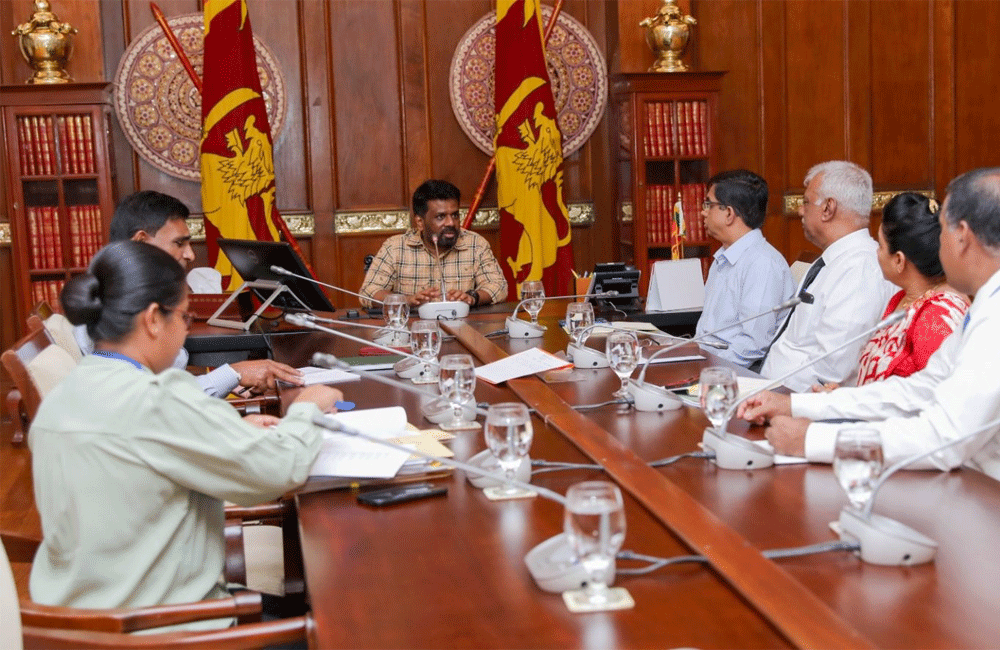
Sri Lanka Airports : New measures to prevent irregularities
President Anura Kumara Dissanayake held a discussion today (28) at the Presidential Secretariat with the heads of the Department of Immigration and Emigration, Sri Lanka Customs, and the Airport and Aviation Services.
The discussion extensively focused on preventing the entry of narcotics and other prohibited substances into the country, curbing corruption, fraud, and irregularities within airport premises, and halting the unauthorized departure of individuals from the country.
During the meeting, President Dissanayake instructed the establishment of an integrated camera system and a unified observation room to be shared among the Department of Immigration and Emigration, Sri Lanka Customs, and the Airport and Aviation Services.
The President also emphasized the need for a practical and modernized process to prevent smuggling, calling for the replacement of the current scanning equipment with advanced, modern scanners.
Highlighting the need to eliminate the negative perceptions surrounding Sri Lanka Customs, the President underscored the urgency of implementing strict disciplinary and legal action to restore public confidence.
The discussion was attended by prominent officials, including Minister of Foreign Affairs, Foreign Employment, and Tourism Vijitha Herath; Minister of Public Security and Parliamentary Affairs Ananda Wijepala; Secretary to the President Dr. Nandika Sanath Kumanayake; Director General of Customs Sarath Nonis; Acting Controller General of Immigration and Emigration BMD Nilusha Balasuriya; and Chairman of Airport & Aviation Services Sri Lanka (Private) Ltd, Air Chief Marshal Harsha Abeywickrama. (PMD)
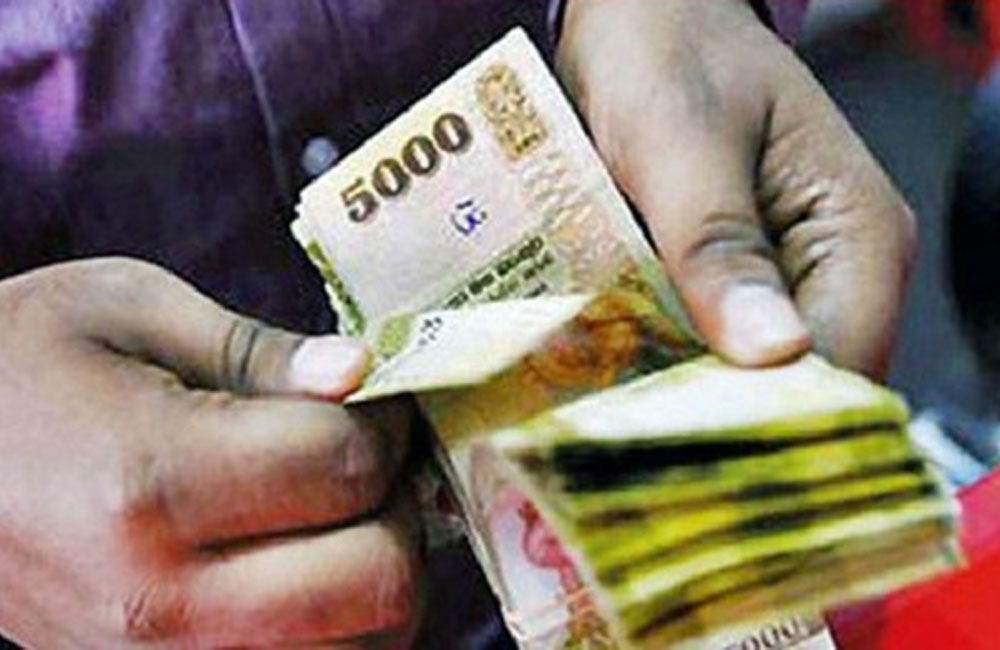
2025 ‘Aswesuma’ Welfare Payments Gazetted
A Gazette notification has been issued announcing the monthly amounts to be paid to ‘Aswesuma’ welfare beneficiaries in 2025.
Accordingly, the monthly payments are as follows:
• Extremely Poor: Rs. 17,500 per month (January–June).
• Poor: Rs. 10,000 per month (January–June).
• Vulnerable: Rs. 5,000 per month (January–December).
• Transitional: Rs. 5,000 per month (January–March).
Accordingly, the previous “Aswesuma” welfare payment scheme, issued on May 17, 2024, has been rescinded.
However, payments under the prior scheme will continue through December 31, 2024, for beneficiaries whose payments were delayed.
Applicants who have not yet been selected for the program will receive payments once their eligibility is confirmed.
This includes individuals who have filed appeals, pending investigations to verify their qualifications.

Maximum Retail Prices announced for Canned Fish
A Gazette notification has been issued stipulating the maximum retail prices for canned fish.
The Extraordinary Gazette notification, issued by the Consumer Affairs Authority (CAA) has stated that no local manufacturer, packer, distributor or trader shall sell, expose or offer for display for sale the types of canned fish listed in the gazette above the stipulated maximum retail price.
The relevant maximum retail prices will be in effect from today (Dec. 28), according to the Consumer Affairs Authority.
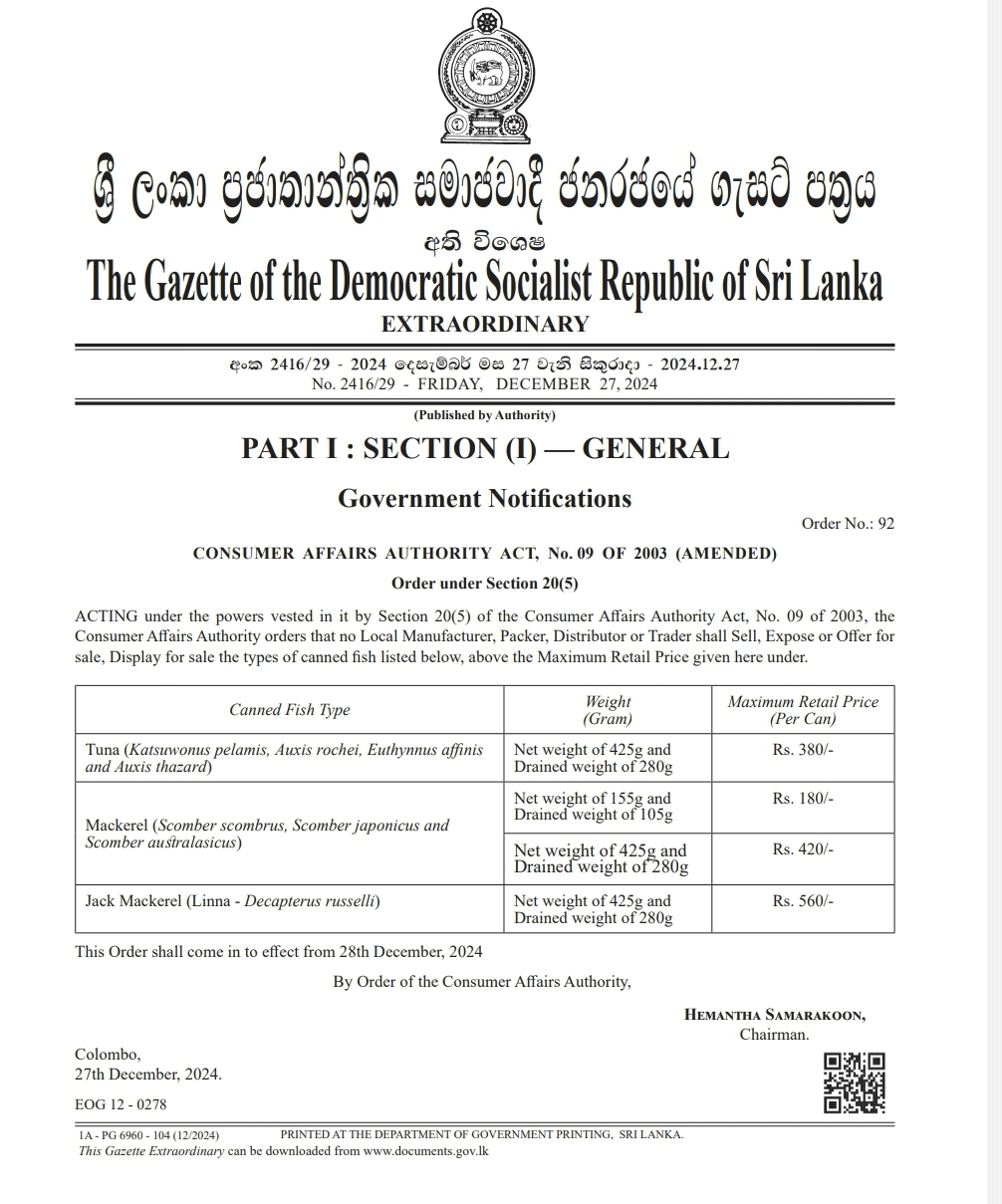
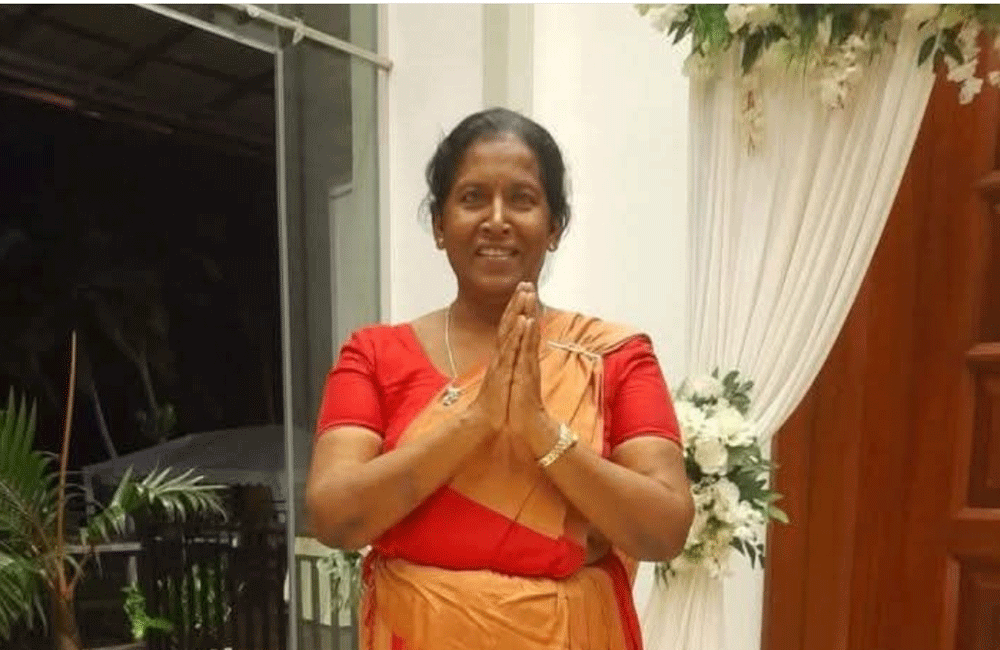
SLPP activist Wasantha Handapangoda passed away in UK
Wasantha Handapangoda, a trade union activist of the Sri Lanka Podujana Peramuna (SLPP) has passed away.
She died in the United Kingdom due to a sudden illness while visiting her daughter.
Handapangoda was a former chairperson of the SLPP Teachers’ Union.
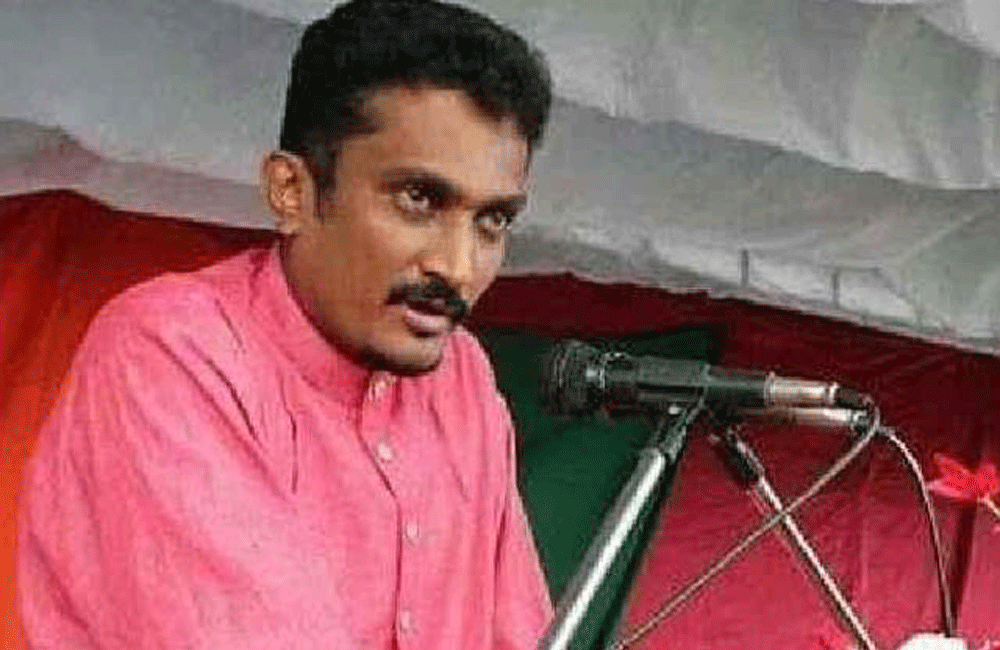
Former Provincial Councillor Salochana Gamage Remanded
Former Provincial Councillor Salochana Gamage, who was arrested on bribery charges, along with one other individual, has been remanded until the 6th of January.
This was after they were presented before the Colombo Chief Magistrate's Court.
The suspects were arrested by the Commission to Investigate Allegations of Bribery or Corruption (CIABOC) while attempting to solicit a bribe of 9 million rupees.
The suspects attempted to solicit the bribe after the Urban Development Authority took over a property in the Torrington Avenue area, in exchange for facilitating the payment of compensation for the land.
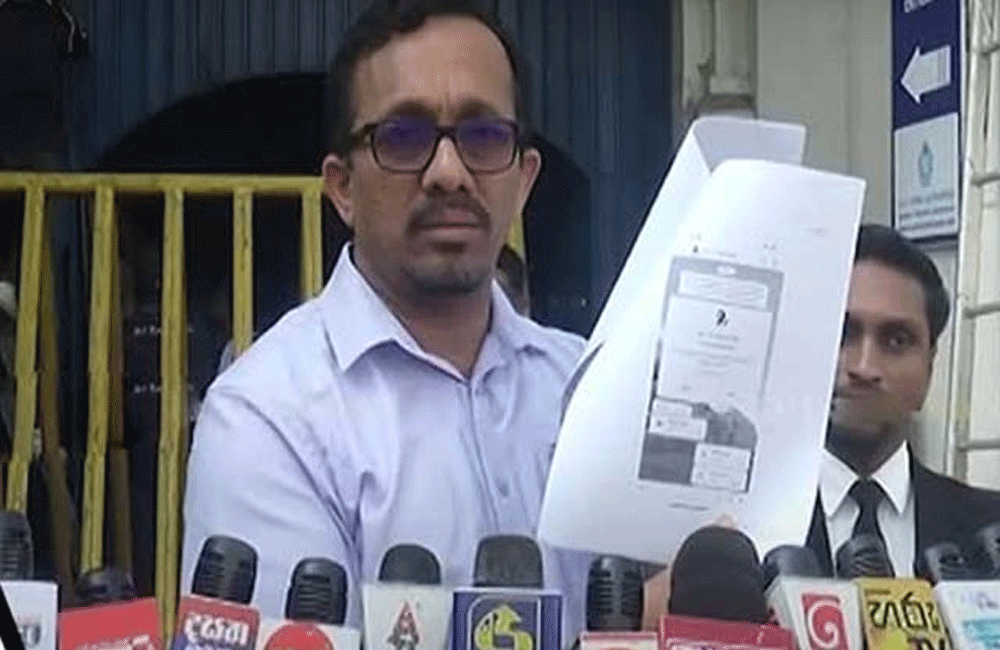
Handuneththi goes to CID over fundraising scam
Minister Sunil Handuneththi has lodged a complaint with the Criminal Investigation Department (CID) regarding a group impersonating him to solicit funds for fake community service projects.
Speaking to the media, the Minister revealed that friends and associates of his in Japan, South Korea, and the UK were contacted via WhatsApp.
“First they take an unclear video call which lasts around 16 seconds, and several bank accounts have been used in this scam. They are fearlessly using my image, voice, and technology to deceive people,” the Minister said.
Handuneththi urged Sri Lankan expatriates to refrain from contributing to these scams, stressing that neither he nor the government solicits funds in this manner. “If we seek funds, it is only through responsible organizations,” he said.
Handuneththi also disclosed that his signature, the official Parliament letterhead, and seal had been forged to promote a fake Zoom discussion scheduled for January 5, 2025.
The Minister has called on the CID to conduct a thorough investigation and enforce the law against the scammers. He appealed to the public for assistance, urging anyone with information or who may have fallen victim to the scam to report their experiences.
“If anyone has donated funds to these fraudulent schemes, we encourage them to come forward and share their information so it can be included in the investigation,” he said.
“If they are bold enough to impersonate public representatives in this manner, one can only imagine the extent to which they might be deceiving the public. It is imperative that the law is enforced against such fraudsters to prevent further exploitation,” he added.
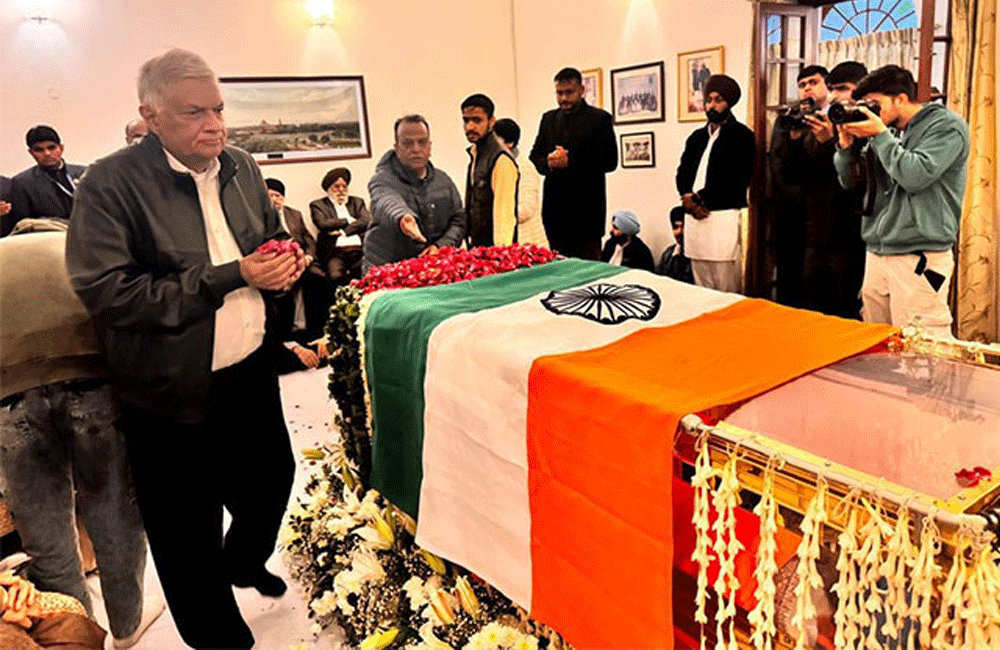
Ranil pays final respects to Former Indian PM Manmohan Singh in Delhi
Former President Ranil Wickremesinghe paid his last respects to the remains of former Indian Prime Minister Dr. Manmohan Singh in New Delhi today (27).
During the occasion, Mr. Wickremesinghe extended his condolences to Dr. Singh’s wife, Gursharan Kaur Kohli.
He also engaged in a brief discussion with Indian opposition leader Rahul Gandhi, who was present at Dr. Singh’s residence in New Delhi.
Ranil Wickremesinghe is currently on a visit to India, during which he took the opportunity to pay his final respects to the former Indian Prime Minister.
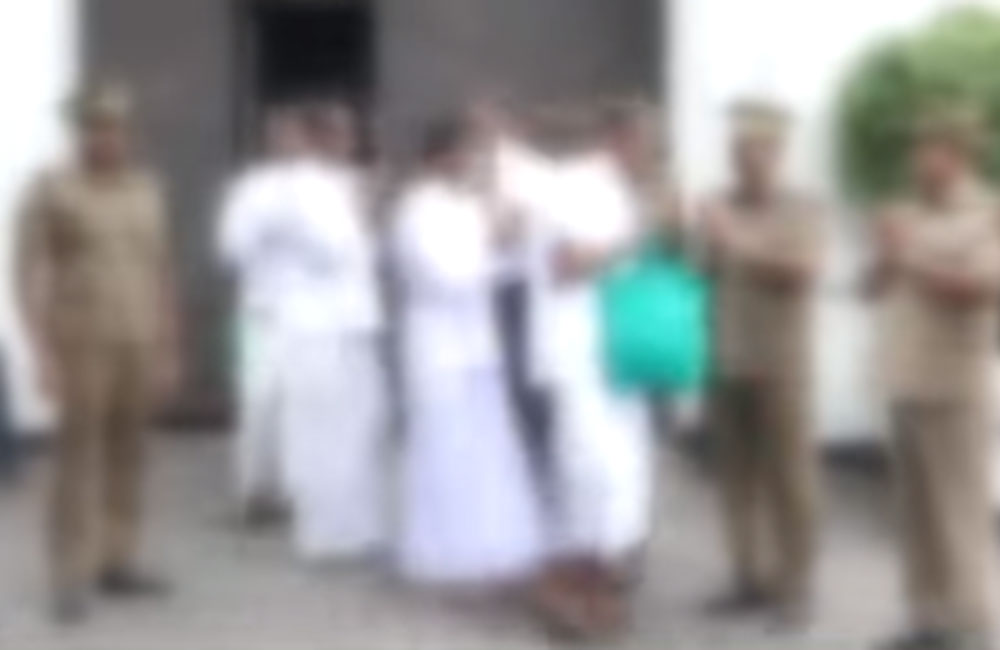
Over 350 inmates to be released under special state pardon for Christmas
The Department of Prisons has announced that a total of 389 prison inmates will be released under special state pardon, in view of Christmas.
Among those to be released, four are female inmates, according to the Prisons Department.
Accordingly, the 389 inmates are released under the two criterias of granting one-week pardon for each year served and the release of prisoners serving prison sentences upon cancellation of their outstanding fines.
Prisons Spokesman said that accordingly, 48 inmates from Mahara Prison, 45 inmates from Wariyapola Prison, 41 inmates from Welikada Prison and several other inmates from all other prisons across the island will be pardoned and released in view of the Christmas.
The procedure is carried out in accordance with the powers vested in the President by Article 34 of the Constitution, according to the Prisons Spokesman.
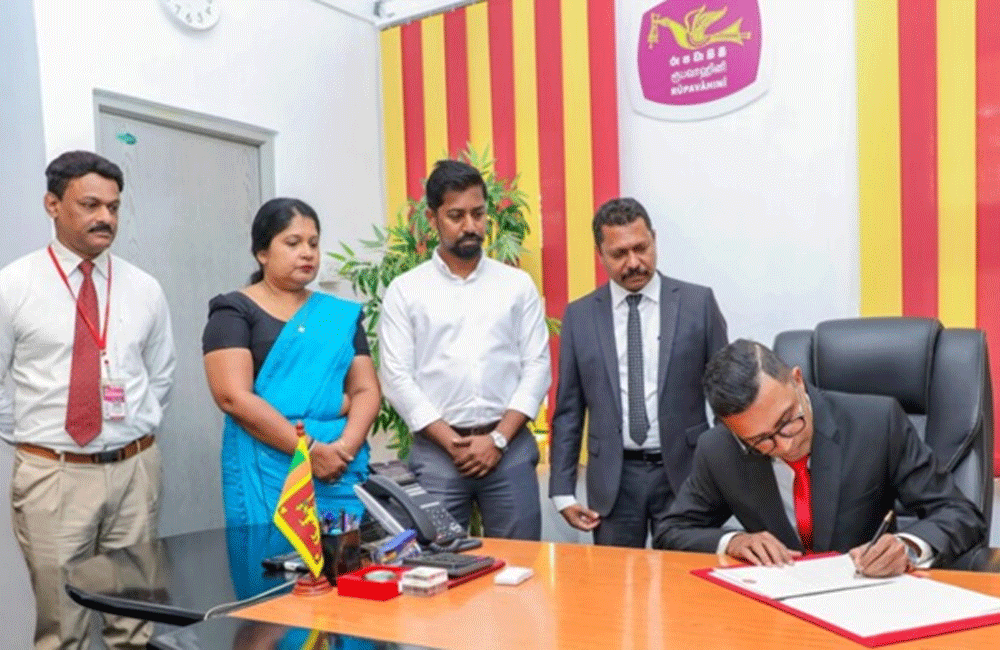
New SLRC Chairman assumes duties
The newly appointed Chairman of the Sri Lanka Rupawahini Corporation (SLRC) Gihan de Silva assumed duties on Thursday (Dec 26).
Appointed by the Minister of Mass Media Dr. Nalinda Jayatissa, he fills the vacancy created by the resignation of the former Chairman Senesh Dissanayake Bandara.
Gihan de Silva is a business professional with over 25 years of experience and has demonstrated capabilities in marketing, strategic planning and management, as well as gaining a reputation for creating impactful brands.
An old boy from Nalanda College, Colombo, he holds a Master’s Degree in Business Administration from Sri Jayewardenepura University and a Post Graduate Diploma in Business Management from Colombo University.
He is also a member of the Presidential Task Force for the government’s ‘Clean Sri Lanka’ programme.
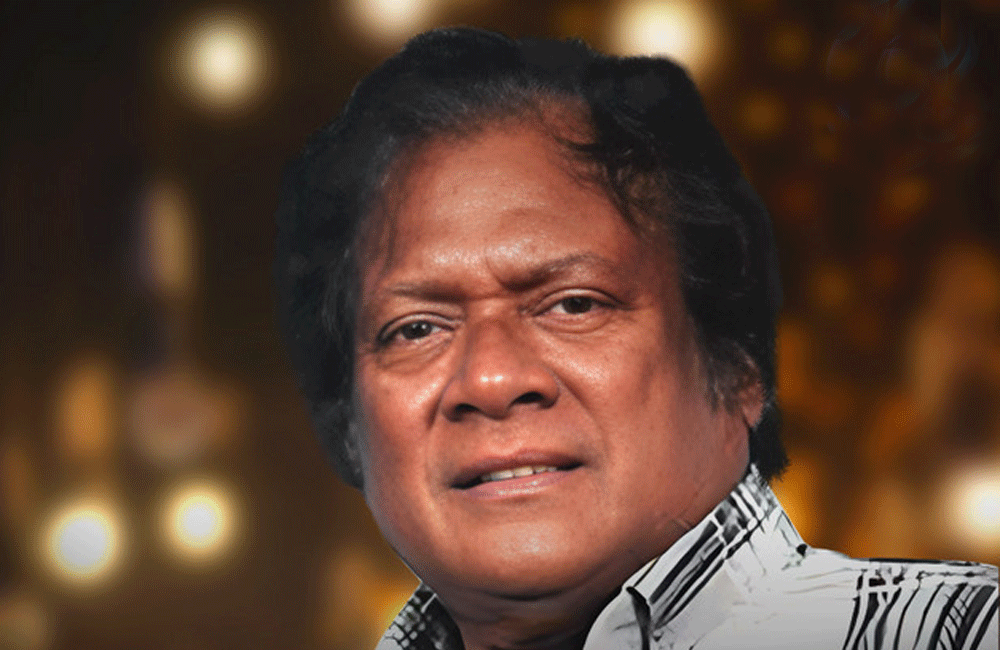
Veteran Singer Priya Suriyasena Passes Away
Veteran Sri Lankan singer Priya Suriyasena has passed away at the age of 80. He breathed his last at the Colombo National Hospital earlier today.
Suriyasena was celebrated for his contribution to the Sri Lankan music industry, with a career spanning decades and numerous beloved hits.
Further details regarding his funeral arrangements are expected to be announced soon.
Page 24 of 534